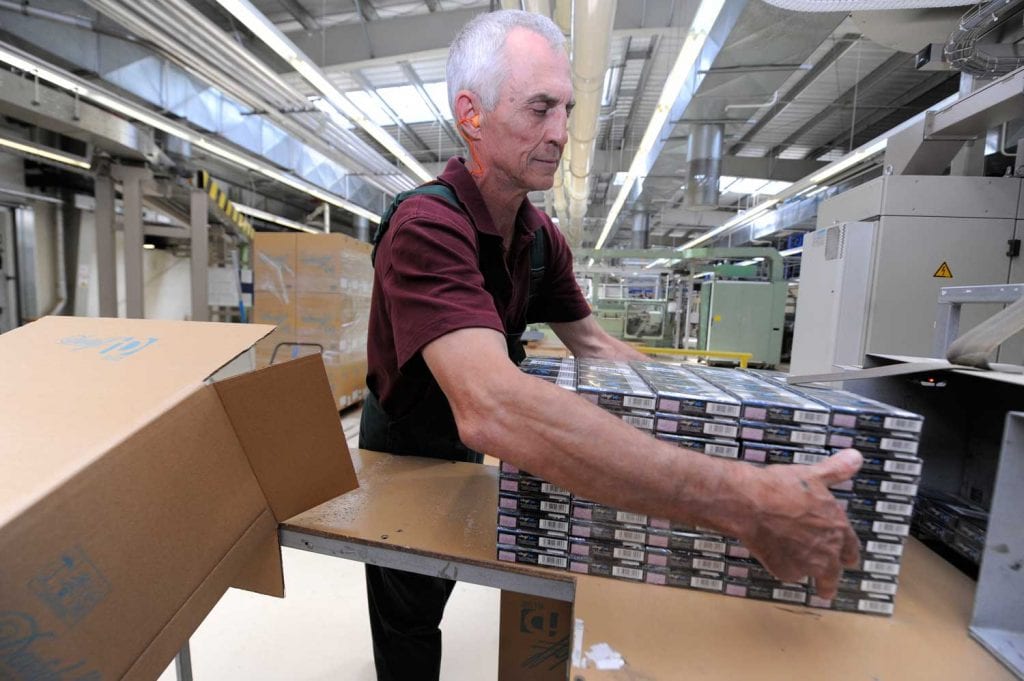Heading for the Exit
- Also in TR
- April 13, 2022
- 0
- 8
- 11 minutes read


Following Russia’s invasion of Ukraine, tobacco companies to retreat from one of the world’s top cigarette markets.
By Stefanie Rossel
Amid growing pressure, the four leading international tobacco manufacturers have joined the exodus of U.S. and European companies that has followed Russia’s invasion of Ukraine. In early March, after the United States, the European Union and Great Britain imposed economic sanctions, all major cigarette makers announced that they would suspend operations or pull out of Russia altogether—although some did so less enthusiastically than others.
After initially announcing it would merely suspend its planned capital investments in Russia, BAT quickly made a U-turn, signaling a far greater retreat. On March 11, the company announced that its ownership of the business in Russia was no longer sustainable in the current environment, which it described as “highly complex, exceptionally fast-moving and volatile.” BAT is in advanced talks to transfer its Russian business to the SNS group of companies, its distributor in the country since 1993. According to SNS, the level of production and the supply and distribution chain would be maintained with a transfer. As a result of the withdrawal, BAT reduced its annual revenue growth outlook to between 2 percent and 4 percent from the 3 percent to 5 percent announced in February.
BAT’s move came a day after a Russian government commission approved the first step toward nationalizing the assets of departing foreign companies. On March 10, Russia’s economic development ministry published a draft bill that would give state-owned Vnesheconombank and the state export guarantee agency the right to seize the property of foreign firms that left Russian markets of their own accord. The proposed law would treat a corporate decision to exit the business as a criminal bankruptcy and empower authorities to initiate criminal justice proceedings against local management, BAT Chief Marketing Officer Kingsley Wheaton told Reuters in an interview.
After announcing plans to scale down its operations in Russia on March 9, Philip Morris International in late March specified the concrete steps it would take, saying it was working on options to exit the Russian market “in an orderly manner.” The company stated that it had discontinued some of its cigarette brands offered in the market and suspended its marketing activities. Furthermore, it had canceled all product launches planned for this year in Russia, including the introduction of its new tobacco-heating product (THP), IQOS Iluma, and its plans to manufacture more than 20 billion Terea sticks, the consumables for IQOS Iluma. Production of the latter would have involved an ongoing investment of $150 million, which the company also canceled.
JTI, meanwhile, limited its withdrawal from Russia to a suspension of all new investments and marketing activities along with the launch of its most recent THP, Ploom X.
Imperial Brands, which has a relatively small footprint in Russia, announced on March 15 that it had started negotiations with a local third party about a transfer of its Russian assets of operations. “We believe that, in the current circumstances, an orderly transfer of our business as a going concern would be in the best interests of our Russian colleagues,” Imperial Brands wrote in a statement.
In addition to their actions in Russia, all four cigarette manufacturers temporarily closed their production sites in Ukraine to protect their workforce and have pledged to continue paying the salaries of employees in the affected countries.

Between a Rock and a Hard Place
In deciding their course of action, cigarette manufacturers faced a dilemma of choosing either to leave and protect their reputations or to stay and continue to benefit from the world’s fourth-largest tobacco market.
The decision to leave not only has financial consequences, but it also presents practical challenges, according to Jon Fell, partner at Ash Park Capital. “It’s one thing to say, ‘we’re no longer going to send our luxury handbags or fashionable training shoes to Russia,’ but if, in addition to factories or distribution centers, you have hundreds or thousands of employees in the country—who up until now have been seen as an integral part of your international company—then you have to take difficult and complex decisions, and there’s no obvious easy, right answer,” he says.
“Sorting the mess out takes time, and you can’t just abandon employees,” adds Fell. “I don’t think the approach of the tobacco industry overall is very different to that of other consumer packaged goods companies, quite a few of whom are continuing to operate in Russia right now—and drawing criticism because of that.”
Russian cigarette makers sold 206 billion cigarettes with an estimated value of $717 billion in 2020, according to Euromonitor International. The market has been declining at a 6 percent compound annual rate over the past 10 years and almost 7 percent over the past five years.
At the same time, the country has developed into a promising market for THPs, which, according to Moningstar, accounted for 11 percent of the total tobacco market in 2021, making the country one of the largest markets for these products outside of Asia.
With a volume share of 38 percent in 2021, JTI has the greatest exposure to Russia of the tobacco multinationals, according to Euromonitor. The company, which in 2018 acquired Donskoy Tabak, has four factories and 4,000 employees in the country. It has invested over $4.6 billion in the past 20 years. In 2020, its tax payments accounted for 1.4 percent of Russia’s state budget. Russia represented almost 16 percent of group volume in 2021, according to Morningstar.

It’s one thing to say, ‘we’re no longer going to send our luxury handbags or fashionable training shoes to Russia,’ but if, in addition to factories or distribution centers, you have hundreds or thousands of employees in the country, then there’s no obvious easy, right answer.
Costly Exits
For PMI, Russia accounted for almost 10 percent of cigarette and THP unit shipment volume and around 6 percent of its total net revenues in 2021. With a market share of 26 percent, the company has three factories, more than 100 sales outlets and approximately 4,100 employees in the country. Ukraine, where PMI runs a factory in Kharkiv with around 1,300 employees, represents about 13 percent of PMI’s regional volume and contributed almost 2 percent to PMI’s total net revenues in 2021.
Morningstar expects PMI’s tobacco volume from Eastern Europe to decline by 45 percent in 2022 with a slow recovery thereafter as the collapse of the ruble is likely to create translational foreign exchange pressure.
Both Russia and Ukraine are important markets for IQOS, accounting for about 23 percent of PMI’s THP sales. PMI’s shipments of THP consumables in Russia increased from 13.6 billion units to 16.3 billion sticks in 2021 while shipments of cigarettes continued to fall. Considering Russia’s worsening economic outlook in the wake of international sanctions, however, a J.P. Morgan analyst doubted that PMI would still be able to achieve its next-generation product growth targets. Morningstar assumes that PMI’s write-down in case of a market exit could be approximately $7 billion, corresponding to 5 percent of the company’s market capitalization.
Ukraine and Russia combined accounted for 3 percent of BAT’s group revenue in 2021 and a slightly lower proportion of adjusted profit, the company said on its website. Morningstar estimates that the bulk of net revenue from these two countries, 2.5 percent, was generated by Russia, where BAT, according to Euromonitor, held 25 percent of the market in 2021. Employing some 2,500 people in Russia, BAT has a factory in St. Petersburg and 75 regional offices. Since the company entered the market in 1991, it has invested more than $1 billion in Russia. Morningstar reckons that the value of BAT’s operations will depreciate by around $2.2 billion, or about 2.4 percent of its market capitalization, as a result of its withdrawal from Russia.
Among the four players, Imperial Brands is a distant fourth, holding 8 percent of the Russian cigarette market. It operates a production site in Volgograd and has a workforce of 1,000. In 2021, the company said, Ukraine and Russia represented in total around 2 percent of net revenues and 0.5 percent of adjusted profits. Due to the limited profit contribution of the two markets, Imperial Brands explained it expected “a relatively small impact” on its constant currency adjusted profit.
Seeking a Backdoor
How the multinationals’ retreat will impact Russia’s illicit cigarette market is anyone’s guess. “It’s very hard to know how demand and supply of tobacco products will evolve in Russia given all that’s going on with sanctions, ownership of the industry and, presumably, local purchasing power,” says Fell. “I would certainly think that an increase in the size of the illicit market is a risk, and that’s also going to depend on how long this situation lasts.” Illegal cigarette sales represented 10.7 percent of the total Russian tobacco market in 2021, up from 4.6 percent in 2017, according to Statista.
Much will depend on how long the conflict continues. Considering the large amounts invested in Russia over the past 20 years, it’s safe to assume that cigarette manufacturers will do their best to minimize their losses. The companies have built strong positions in the Russian market, and there is demand for their products.
“I’d be surprised if any of the companies—not just the tobacco manufacturers—now exiting Russia are doing so in a way that would prevent their going back in the future, assuming that the war stops at some point, relations are normalized and reentry becomes conceivable,” says Fell. “But arranging that in a way which allows you to say you have exited the country for the time being is no doubt very tricky and is likely to be contributing to decisions taking some time to reach and to be implemented.”

